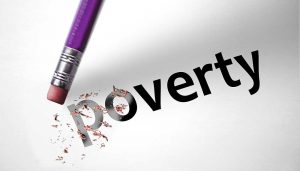By Editorial Staff

The problem of poverty is one of the terrible dilemmas that the world has been encountering since the ancient ages and whose consequences are dreadful. In the today world, 767 million people live on less than $1.90 and undergo acute social, healthy, educational, etc. conditions at all levels. It is extremely alarming. The spread of poverty means a dramatic increase of the rates of crime, diseases, moral degeneration, lack of education, consummation of drugs and alcohol, wreckage of families and even civil wars.
Therefore, Islam, since its onset, has managed to fight poverty and cut its roots off the society by various means. Islam attempts to preserve people from these dangers that influence the whole community all morally, spiritually and ideologically. The Prophet (peace be upon him) used to supplicate God, “O Allah, I ask refuge with Allah from disbelief and poverty.” (Abu Dawud)
Islam provided a set of procedures to face this phenomenon and limit its impacts on the individual and community. We can tackle some of these rules that, when had been perfectly applied, managed to protect the whole community from the dangers of poverty.
It happened during the Caliphate of `Umar ibn `Abdul `Aziz (may Allah confer mercy upon him) that poverty was cut off the Muslim society. History has never recorded that poverty was eliminated in any nation other than the Islamic nation during his time. `Umar (may Allah confer mercy upon him) adopted the Islamic approach for combating poverty which ensured honest and fair distribution of the resources with no discrimination or partiality. He succeeded to protect the nation from the catastrophic consequences of poverty and accomplished high levels of development and prosperity of the nation.
We notice that the Islamic approach to combat poverty is not limited to the economic side alone. Rather, the whole Islamic faith is employed in this circle through its sound articles of faith, acts of worship, economic rules and rules of moral conduct. The Islamic course is not a capitalistic or socialistic system but it provides a unique example that should be perused by everyone who needs to extinguish the fires of poverty from the community. Let’s review some sides of the Islamic methodology to eliminate poverty starting by the ideological side:
The Islamic Faith and Poverty
When the Qur’an discussed the issue of creation, it revealed to us that Allah has put forth in the earth the supplies that ensure a perfect life for all creatures. God says,
Say, “Do you indeed disbelieve in He who created the earth in two days and attribute to Him equals? That is the Lord of the worlds.” And He placed on the earth firmly set mountains over its surface, and He blessed it and determined therein its [creatures’] sustenance in four days without distinction – for [the information] of those who ask. (Fussilat 41:9-10)
The Qur’an teaches that God has provided the earth with the provisions that guarantee fair levels of life for all people and other creatures. However, the widespread aggressions and waste of man against the natural resources are responsible for the deprivation that a great deal of people undergoes. Moreover, Allah assures people that He has fairly guaranteed for people their sustenance and they should not feel worry about this. God says,
And I did not create the jinn and mankind except to worship Me. I do not want from them any provision, nor do I want them to feed Me. Indeed, it is Allah who is the [continual] Provider, the firm possessor of strength. (Adh-Dhariyat 51:56-58)
This statement makes people assured about their essential provisions and gets them rid of the worries that cultivate the feelings of poorness, and develop restless covetousness for seizing bigger amounts of the provisions. These worries lead to excessive keenness and pursuit of money which finally contribute to the richness of strongest part of the community on behalf of the weak part. Islamic faith makes man be satisfied with what is provided for him and confidently work on to get his guaranteed amount without fear or worry. The belief in God, the All-Provider, cuts off the feelings of poverty psychologically before it does so economically or socially.
The Divine Laws
Almighty Allah has put specific laws that control the course of existence for both man and the universe. These laws are axiomatic and must be taken for accomplishing the purposed goals. They regulate the natural interaction between man and other things. These laws are what all of people or other living creatures should act on to live, such as eating, drinking, etc. Islam makes it obligatory to act upon these laws to gain prosperity and commands people to forsake all kinds of superstitions and delusions. Almighty Allah says,
Indeed, Allah will not change the condition of a people until they change what is in themselves. (Ar-Ra`d 13:11)
Man has to work hard and exert the effort to get what he aspires for, and neglect the helpless means that has nothing with reality such as sorcery or fortunetelling. Everything in the world is predestined by God, but you need to work intensely to get your portion. God says,
It is He who made the earth tame for you – so walk among its slopes and eat of His provision – and to Him is the resurrection. (Al-Mulk 67:15)
Abu Hurairah (May Allah be pleased with him) reported: The Prophet (peace be upon him) said, “No food is better to man than that which he earns through his manual work. Dawud (peace be upon him), the Prophet of Allah, ate only out of his earnings from his manual work.” (Al- Bukhari) The Islamic creed implants in people the necessity of perseverance and diligence to accomplish their desired goals.
The Reward in the Hereafter
It is part and parcel of the Muslim’s faith is to believe in the Hereafter in which people will be held accountable for their deeds in the worldly life. Doing good and helping others are highly rewarded in the Hereafter. Almighty Allah says,
But the ones who believe and do righteous deeds – We will admit them to gardens beneath which rivers flow, wherein they will abide forever. [It is] the promise of Allah, [which is] truth, and who is more truthful than Allah in statement. (An-Nisaa’ 4:122)
On the top of the most abundantly rewarded practices is helping other and giving out of one’s money for the sake of pleasing our God. Almighty Allah says,
And hasten to forgiveness from your Lord and a garden as wide as the heavens and earth, prepared for the righteous. Who spend [in the cause of Allah ] during ease and hardship and who restrain anger and who pardon the people – and Allah loves the doers of good. (Aal `Imran 3:133-134)
Abu Hurairah (may Allah be pleased with him) narrated that the Messenger of Allah (peace be upon him) said: “If anyone relieves a Muslim believer from one of the hardships of this worldly life, Allah will relieve him of one of the hardships of the Day of Resurrection. If anyone makes it easy for the one who is indebted to him (while finding it difficult to repay), Allah will make it easy for him in this worldly life and in the Hereafter, and if anyone conceals the faults of a Muslim, Allah will conceal his faults in this world and in the Hereafter. Allah helps His slave as long as he helps his brother.” (Muslim)
The texts that entice people to philanthropy and openhandedness with others are numberless. So, the Islamic creed connects man with His Lord and with the hereafter. Man has to be grateful to God by giving others for the sake of Him. It is a kind of dutifulness to Allah who has given one specific pleasures more than others to donate from them to the poor and the needy. The Islamic creed urges us to be beneficial to others in the broad meaning of the word. Be always reminded of the Prophet’s saying, “Allah helps His slave as long as he helps his brother.” (Muslim)
This is a part of the Islamic effort to combat the international as well as the local poverty and eliminate its roots from the society..
To be continued..
[opic_orginalurl]

